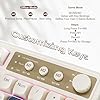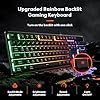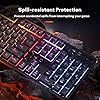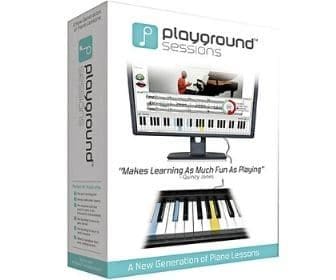Table of Contents
Introduction
Learning to play the piano is an exciting and rewarding journey, but like any skill worth mastering, it comes with its own set of challenges. Staying motivated throughout this process is crucial to your success and enjoyment. Whether you are a beginner just starting out, or an intermediate player facing a plateau, finding effective ways to maintain your enthusiasm can make all the difference. In this guide, we will explore practical tips and strategies to help you stay inspired and committed to your piano lessons.
Setting Achievable Piano Goals
To stay motivated while learning the piano, it is crucial to set goals that are challenging yet attainable. Here are some steps to help you set achievable piano goals:
P71 Digital Piano Review and Guide
$0.00 (as of November 22, 2025 14:40 GMT -08:00 - More infoProduct prices and availability are accurate as of the date/time indicated and are subject to change. Any price and availability information displayed on [relevant Amazon Site(s), as applicable] at the time of purchase will apply to the purchase of this product.)Wicked - A New Musical Songbook by Stephen Schwartz | Piano Vocal Selections with 13 Broadway Hits | Sheet Music for Piano Voice and Guitar | Authentic Arrangements for Performers Students and Fans
31% OffReady for Theory Level 3 Piano Review Book (Ready for Theory Piano Review Books)
$12.95 (as of November 22, 2025 14:46 GMT -08:00 - More infoProduct prices and availability are accurate as of the date/time indicated and are subject to change. Any price and availability information displayed on [relevant Amazon Site(s), as applicable] at the time of purchase will apply to the purchase of this product.)The Piano Proficiency Exam Review Book
$14.57 (as of November 22, 2025 14:43 GMT -08:00 - More infoProduct prices and availability are accurate as of the date/time indicated and are subject to change. Any price and availability information displayed on [relevant Amazon Site(s), as applicable] at the time of purchase will apply to the purchase of this product.)1. Break Down Your Goals
Instead of aiming to learn a whole piece of music, break it down into smaller sections. For example, aim to master just the first few bars or a particular section. This makes the task less daunting and provides a sense of accomplishment as you complete each part.
2. Be Specific
Set clear, specific goals such as “Practice scales for 10 minutes every day” or “Learn the first movement of Beethoven’s Moonlight Sonata.” Having a well-defined goal helps you understand exactly what you need to do to achieve it.
3. Set Measurable Milestones
Ensure that your goals are measurable. For instance, you could set a goal to play a piece at a particular tempo or without any mistakes. This allows you to track your progress and see how far you’ve come, which can be very motivating.
4. Align Goals with Your Interests
Make sure your goals reflect your musical interests. If you enjoy jazz, set goals that involve learning jazz standards or improvisation techniques. When you are passionate about what you’re learning, you are more likely to stay motivated.
Logitech MK270 Wireless Keyboard and Mouse Combo for Windows, 2.4 GHz, 8 Multimedia Keys, PC, Laptop, Wireless Keyboard Compact Mouse Combo - Black
33% OffAULA S99 Gaming Keyboard, Wireless Computer Keyboards, Tri-Mode Bluetooth/2.4GHz/USB-C Custom Creamy Keyboard with Number Pad, RGB Backlit Media Knob Cute Programmable Keyboard for PC Gamer - Green
15% OffRedragon K521 Upgrade Rainbow LED Gaming Keyboard, 104 Keys Wired Mechanical Feeling Keyboard with Multimedia Keys, One-Touch Backlit, Anti-Ghosting, Compatible with PC, Mac, PS4/5, Xbox
15% OffWireless Keyboard and Mouse Combo, Full Size Silent Ergonomic Keyboard and Mouse, Long Battery Life, Optical Mouse, 2.4G Lag-Free Cordless Mice Keyboard for Computer, Mac, Laptop, PC, Windows
$25.99 (as of November 22, 2025 07:20 GMT -08:00 - More infoProduct prices and availability are accurate as of the date/time indicated and are subject to change. Any price and availability information displayed on [relevant Amazon Site(s), as applicable] at the time of purchase will apply to the purchase of this product.)5. Set Realistic Deadlines
Give yourself a reasonable timeframe to achieve your goals. Setting unrealistic deadlines can lead to frustration, while overly generous deadlines may result in procrastination. Find a balance that keeps you moving forward without undue stress.
6. Adjust Goals Based on Progress
Be flexible and willing to adjust your goals as needed. If a particular goal turns out to be too easy or too hard, modify it to better suit your current skill level. This ensures that you stay challenged without feeling overwhelmed.
7. Celebrate Small Wins
Acknowledge and celebrate your progress, no matter how small. Completing a section of a piece or nailing a difficult passage deserves recognition. Celebrating these milestones will keep you motivated and reinforce your progress.
Tracking Progress to Stay Encouraged
Staying motivated while learning the piano can be challenging, but tracking your progress methodically can provide a tremendous boost to your enthusiasm and commitment. Here are some effective ways to keep tabs on your developments and stay encouraged:
Maintaining a practice journal can help you systematically record your daily or weekly practice sessions. Note down what pieces you worked on, how many repetitions you did, and any particular hurdles you faced. Revisiting your journal entries can give you a clear perspective on how far you’ve come.
Take periodic video or audio recordings of your practice sessions. Not only can you track your technical improvements, but seeing and hearing where you once struggled provides tangible proof of your progress. Tools like smartphones and tablets make this easier than ever.
Break down your learning process into smaller milestones and celebrate each one. Whether it’s mastering a new scale, completing a difficult passage, or memorizing a piece, acknowledging these small victories can keep your morale high.
Set both short-term and long-term goals for your piano learning journey. Goals could range from learning a particular piece to improving sight-reading skills. Regularly reviewing and adjusting these goals can help you stay focused and motivated.
Leverage piano learning apps that offer progress tracking features. Many apps provide real-time feedback, track the amount of time you practice, and even offer challenges and rewards as you hit certain benchmarks.
Performing for an audience, whether it’s just family and friends or a larger crowd, can be a wonderful way to gauge your progress. The preparation itself is a great learning experience, and the applause is a rewarding recognition of your hard work.
Scheduled lessons with a piano instructor provide structured feedback that can highlight your strengths and areas for improvement. A teacher can also help set achievable goals and offer inspiration and motivation through their expertise.
Apart from technical skills, it’s also important to note your emotional responses to learning piano. Journaling about how certain pieces make you feel or your overall mood during practice can help you understand what motivates you and what hinders your progress.
By implementing these methods to track your progress, you not only create a clearer picture of your achievements but also build a robust system to keep your motivation levels high throughout your piano learning journey.
Finding a Piano Community for Support
Rewarding Yourself for Milestones Achieved
Setting and achieving milestones is crucial in maintaining motivation while learning piano. Rewarding yourself appropriately can reinforce your dedication and make the learning process enjoyable. Here are several ways to celebrate your progress:
When you reach a significant milestone, such as mastering a challenging piece or consistent practice for a month, reward yourself with a small gift. This could be new sheet music, a piano accessory, or even a non-musical treat like a dinner out. The idea is to create a positive association with your achievements.
Organize a personal recital to showcase your progress. This can be as simple as performing for your family and friends or recording a video to share on social media. The act of preparing and performing is not only rewarding but also boosts your confidence and showcases your hard work.
After achieving a milestone, taking a short break can be a great reward. A break could mean a few days off from piano practice to relax or engaging in a different creative activity to rejuvenate your spirits and renew inspiration.
If you’ve hit a major milestone, consider rewarding yourself with an upgrade to your piano or accessories. For example, a new piano bench, upgrading from a keyboard to an acoustic piano, or investing in high-quality headphones for silent practice can significantly enhance your playing experience.
One of the most effective ways to celebrate your progress could be to invest in advanced professional lessons. This not only rewards you but also pushes your skills further, allowing you to tackle more complex compositions with the guidance of a professional.
Overcoming Plateaus in Piano Learning
Hitting a plateau often means your current practice routine has reached its limit in terms of benefits. To overcome this, start by changing up your routine. Incorporate new techniques, such as sight-reading, ear training, and improvisation. This can help refresh your approach and stimulate different areas of your musical brain, keeping your practice sessions engaging and productive.
Setting clear, attainable goals is crucial when you’re stuck. Rather than focusing on broad objectives like “improve my piano playing,” aim for more specific goals like “master the first movement of Beethoven’s Moonlight Sonata within two months.” Breaking down large tasks into smaller milestones can provide a sense of accomplishment and build momentum.
Sometimes, you may be too close to your own playing to see what needs improvement. Regular feedback from a piano teacher or even fellow musicians can provide new insights and perspectives. A fresh set of ears can help identify issues you may have overlooked and offer solutions you hadn’t considered.
Leveraging technology can provide novel ways to overcome plateaus. Apps like Flowkey, Simply Piano, and Synthesia can offer interactive tutorials and instant feedback that can identify weak points in your playing. These platforms often include gamified elements, which can make practice sessions more enjoyable and effective.
Frequently recording your practice sessions can be incredibly enlightening. Listening to your recordings allows you to hear your progress and identify areas that need improvement. It also provides a tangible record of your progress, which can be highly motivating when you feel like you’re not advancing.
Engaging with a community of fellow piano learners can provide the emotional and intellectual support you need to move past a plateau. Whether it’s through online forums, local piano meet-ups, or social media groups, sharing experiences and challenges can inspire new ideas and strategies. Sometimes, just knowing you’re not alone in your struggles can be a significant morale booster.
Although it might sound counterintuitive, sometimes taking a short break can be beneficial. Continuous practice without rest can lead to burnout, making the plateau feel even more insurmountable. Short breaks can rejuvenate your mind and body, allowing you to return to the piano with renewed energy and perspective.
Experimenting with different genres of music can give you a new appreciation for the piano and keep things interesting. If you’ve been focusing mainly on classical pieces, try exploring jazz, blues, or pop music. Each genre comes with its own set of challenges and learning these can provide new technical skills and a fresh outlook.
Conclusion
Staying motivated while learning piano requires a combination of setting clear goals, embracing a growth mindset, and maintaining a consistent practice schedule. Break down your goals into manageable steps and celebrate small achievements to keep your enthusiasm high. Always remember that progress takes time and resilience. Utilize tools like practice diaries, engaging with a community of learners, and varying your practice routine to maintain motivation. With patience and dedication, your piano learning journey will be both rewarding and enjoyable.

























































